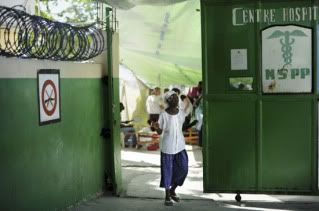Tomorrow in NYC the UN Donors’ Conference for Haiti which will discuss the current and future needs of Haiti after the devastating Earthquake on January 12.
Tonight on Frontline they will air the documentary The World is Coming to an End
On Jan. 12, 2010, one of the most devastating earthquakes in recorded history leveled the Haitian capital, Port-au-Prince. Those responsible for handling the catastrophe, including the Haitian government and the United Nations, were among the victims. FRONTLINE correspondent Martin Smith bears witness to the scale of the disaster and takes viewers on a searing and intimate journey into the camps, hospitals and broken neighborhoods of Port-au-Prince. Featuring never-before-seen footage of the moments after the earthquake and interviews with top officials from Port-au-Prince to Washington, The Quake ultimately asks, how will the world respond?
The crisis for the Haitian people is still happening and getting worse with the rain. I don’t want to think of the catastrophe that awaits with the hurricane season but I must, so must the world.


